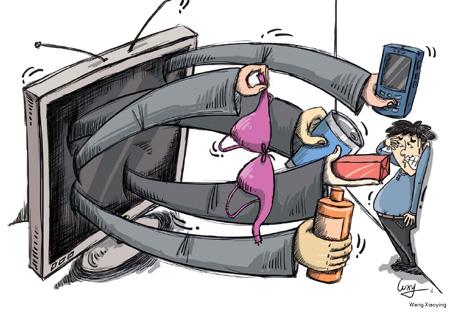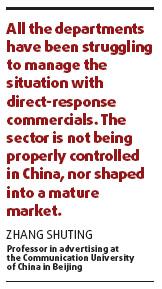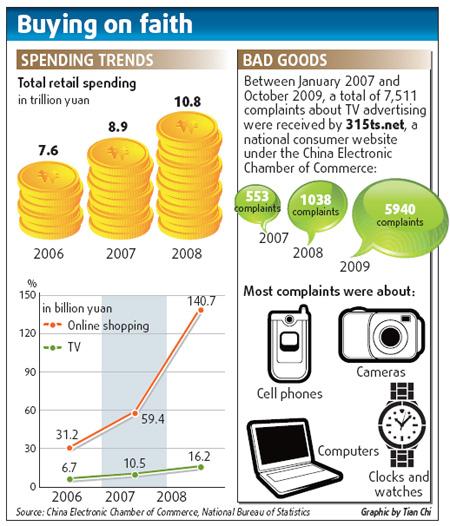
Deng Xiaobing had been waiting for days for his new cell phone to arrive in the mail. According to the television show he called to order it, the phone was a high-tech model and a dead cert to impress his friends.
What arrived in the mail was far from what was promised.
"The phone is total rubbish," said the 24-year-old printer from Beijing. "I paid 499 yuan, a quarter of my monthly salary, but it is not what the hosts of the show said it was at all."
Deng is just one of thousands of consumers who have been deceived by direct-response infomercials, which are usually late-night promotions for products fronted by loud and excited young presenters.
Last year, Shanghai authorities alone received more than 4,226 complaints about infomercials - 30 times the number than in 2004, showed figures from the local industry and commerce bureau. More than 3,000 unhappy customers in the city registered their anger in the first quarter of this year, a 28-percent rise on 2008.
"I blame the hosts. They claimed the phone had the same functions as a Nokia, the brand from Finland. It could surf the Internet, and receive radio and television, they said. But it can't," said Deng, who saw the infomercial on a television station based in Jiangxi province.
The phone was in fact an earlier model than advertised, he complained, adding that the keypad was unusable and the sound was muffled. "I felt so stupid when I realized I'd been cheated," he groaned.
Retail sales in China hit 10.8 trillion yuan ($1.5 trillion) last year. However, television shopping took less than a 0.2 percent share, with just 20,000 consumers spending a combined 16.2 billion yuan, according to the China TV Sales Research and Development Center, which is affiliated with the Beijing University of Posts and Telecommunications.
Like Deng, 27-year-old Beijing tour guide Qin Meng thought she had found a bargain when she bought an "invisible" bra for 560 yuan after watching an infomercial in 2007. But just days later she saw an identical product in a department store priced at just 70 yuan.
"These direct advertisers know how to grab the consumers' attention, and prey on people's impulses. I paid the price," she said.
Zhang Shuting, a professor in advertising at Communication University of China in Beijing, said purchases from infomercials accounted for as much as 60 percent of all television retail sales each year, and added that the figure is increasing.
However, unlike in the United States, Britain or Japan, where infomercials also run, Chinese buyers find it almost impossible to get refunds for poor quality goods because advertisers rarely give customers their real contact details.
 Beijing police officers go through fake order sheets confiscated from suspected TV informercial cheats on Nov 26. More than 80 suspects were arrested last month in the capital's Fangshan district as part of an anti-deception campaign targeted at TV advertisers by local police. [China Daily]
Beijing police officers go through fake order sheets confiscated from suspected TV informercial cheats on Nov 26. More than 80 suspects were arrested last month in the capital's Fangshan district as part of an anti-deception campaign targeted at TV advertisers by local police. [China Daily]
Almost 200 million people in China watch television every day and, according to a 2006 study by CTR Market Research in Beijing, 94 percent of all infomercials are targeted at housewives watching in the afternoon and people who watch late into the night.
Less than 50 percent of the consumers polled were happy with their purchases from direct-response television, the survey said.

"Advertisers have been attracted to direct-response commercials by the vast number of viewers and potential profits," said Zhang Shuting. "Also, television stations are happy because they usually struggle to find advertisers for off-peak times, such as after midnight and before 6 am. These infomercials give them extra income."
In its last study, also in 2006, the China Consumers' Association discovered infomercials made up 61 percent of all "illegal" advertising - when the products promoted are of poor quality - on 30 major television channels across China.
Media experts said supervision of advertising standards is inefficient as it falls under too many government departments, including the State Administration of Industry and Commerce, and State Administration of Radio, Television and Film.
"All the departments have been struggling to manage the situation with direct-response commercials," said Zhang. "Because of this, the sector is not being properly controlled in China, nor shaped into a mature market."
A joint notice from several administrations banned the use of television and radio infomercials to promote medicine or medical devices, as well as products that promised weight loss, height gain or larger breasts, from Aug 1 last year. But many Chinese channels continued to carry direct-response advertisements for such products after the deadline, resulting in the authorities issuing warnings to 12 stations.

Officials for the administration estimated the ban impacted almost half of all direct television shopping programs, but insisted it was in the best interests of the industry in the long term.
A mature market where quality can be ensured will help promoters to make more profits, officials said.
Infomercials are currently classed as television "shows", which means they are not required to meet the nation's advertising standards. However, that will be rectified from Jan 1 next year, according to a second notice by the administration on Sept 21.
Experts said the move would mean infomercials are vetted before being syndicated across China or sold to satellite stations, like those based in Beijing, Tianjin and Chongqing.
Direct-response advertisements were also banned from news channels and international channels, such as CCTV 9, and cannot be shown on satellite channels between 6 pm and midnight. Products deemed unsuitable for minors, such as breast-enlargement supplements, can also no longer be broadcast on channels aimed at children.
Gong Zhiwei, a Beijing-based advertising agent in his 30s, works with dozens of provincial television stations. He said his clients often run commercials, phone lines and distribution offices in three different cities, making them hard to trace.
Companies simply "skip town" and start somewhere else under a new name if their advertisements are pulled because of too many complaints, he added.
To combat this, the authorities have tightened the rules governing advertisers. Before airing a commercial, stations are now required to check promotion firms have fixed head offices where they can be traced, as well as registered capital of at least 10 million yuan.
Television companies are encouraged to shun advertisers that have been found guilty of fraud by the monitoring authorities in the past three years.
"All our clients must show us their licenses first," said Zhang Hao, a manager with CCTV Home Shopping. "Before any infomercial is broadcast on our channel, our staff also checks the content and script. No false information or exaggerated lines are tolerated."

Following the Sept 21 notice, several stations scrapped all direct-response advertising. A Zhejiang TV employee told China Daily the station has stopped running the commercials "even though it has cost us a lot of money".
But infomercials have not disappeared entirely and many still litter the schedules, promoting hair-loss creams and cell phones, which are usually pirated copies of well-known brands like Nokia, Apple and Motorola.
The China Advertising Association publicly condemned 58 illegal infomercials on Sept 25 after an investigation by the State Administration of Industry and Commerce.
It was the fifth time the association has spoken out against bad advertising since 2006. But "as an industry association, all we can do is monitor and speak out after illegal programs have been aired", said Yang Hongsheng, vice-chairman of the association. "We cannot prevent commercials from being broadcast in the first place."
Most of the programs mentioned in the latest notice were for products hosts claimed could cure illness, help people lose weight or remove scars. None of the advertisers were punished, despite the Law on Advertising stating that violators should face heavy fines.
Zeng Jingping, an expert with the China TV Sales Research and Development Center, added: "China has a huge potential market for TV shopping but we need better regulation to make sure products are genuine."
Home shopping channels and infomercials generate 8 percent of all retail sales volume in the United States, and more than 10 percent in South Korea. In China, it is little over 0.1 percent, and Zeng blamed the lack of consumer confidence in China for hampering its development.
He told the Next Generation Internet and Developing China Summit in Beijing in August that the government is working to set up an advertising standards agency, similar to those already monitoring television and radio in the US, Britain and Japan.
The center would soon begin publicizing tracking information for all television advertisements, meaning rogue operators would have nowhere to hide, he said.
Despite its faults, experts and shoppers argue that there is a place for direct-response advertising.
Wang Xueming, a Beijing judge in her 30s, said she has twice bought products after watching late-night infomercials: a "slider" cell phone and skin-whitening cosmetics.
"My friends think I am a little naive for buying from television shows but I don't mind," she said. "Sometimes goods in the shops don't meet our expectations either, so it's good that we have choice. Although it's important that someone is making sure what is sold on TV is good quality and genuine."
A consumer study last year by Beijing-based media research company CSM suggested only 17 percent of television viewers trust direct-response advertisements, while more than 94 percent of viewers aged 25 to 60 immediately switch channels when they see an infomercial.
"I like infomercials, but I can't say why," said a 35-year-old Beijing resident surnamed Cui. "Maybe it is because of all the shouting and strange facial expressions. I don't buy any of their products, of course. I just watch for fun."





